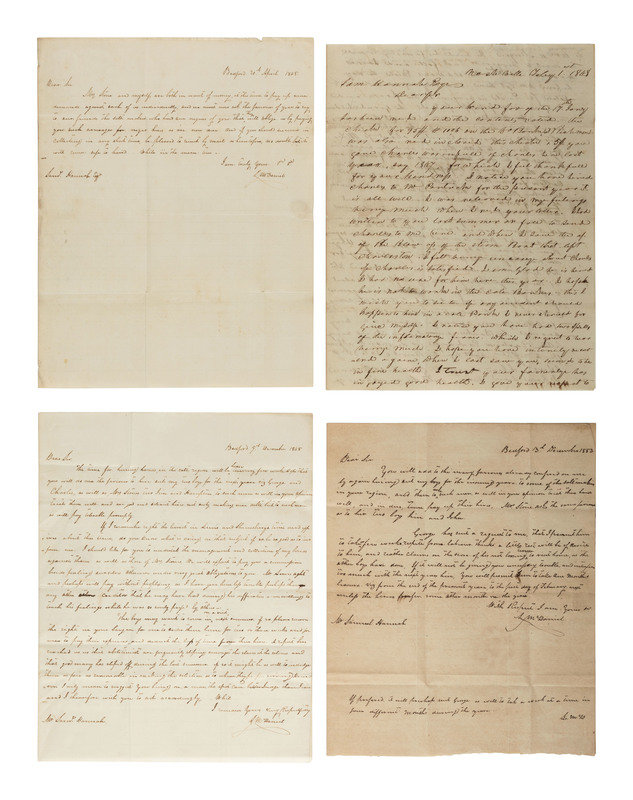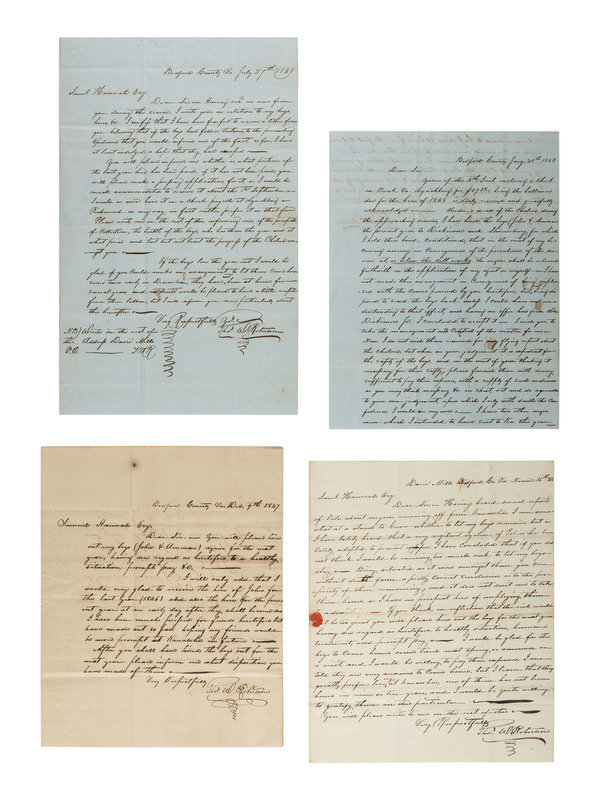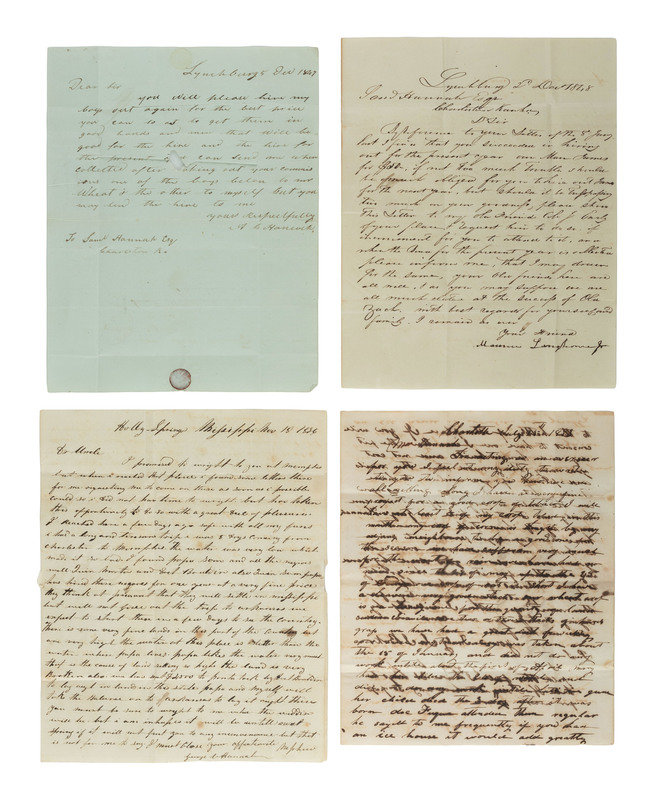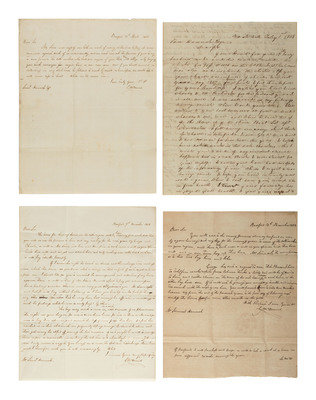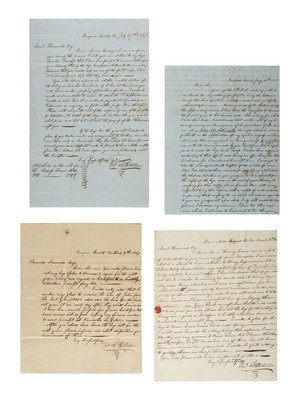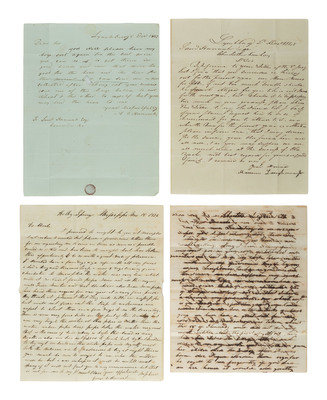Lot 178
[ABOLITION & SLAVERY]. Letter group related to enslaved persons working seasonally in the Western Virginia salt industry.
Sale 1250 - American Historical Ephemera & Photography
Nov 30, 2023
10:00AM ET
Live / Cincinnati
Own a similar item?
Estimate
$3,000 -
5,000
Price Realized
$5,985
Sold prices are inclusive of Buyer’s Premium
Lot Description
[ABOLITION & SLAVERY]. Letter group related to enslaved persons working seasonally in the Western Virginia salt industry.
A group of 12 stampless covers, spanning 1847-1853, each addressed to Samuel Hannah (1792-1859) of Charleston, Kanawha County, Virginia, and related to the industrial use of slavery in the salt industry of the Great Kanawha Valley of Virginia (present-day West Virginia). Correspondence to Hannah from enslavers in Tennessee, Virginia, and North Carolina demonstrates the manner in which enslaved individuals were hired out to industrial salt mines by their owners, and the unique regional considerations involved in this type of forced labor.
Samuel McDaniel, an enslaver from Bedford County, Virginia, writes to Hannah on 20 April 1848: "Mrs. Stone and myself are both in want of money, at this time to pay up some demands against each of us individually, and we must now ask the favour of you to say to our friends the salt makers who hired our negroes of you that they will oblige us by paying you such our wages for negro hires as are now due...." Eight months later in December 1848 McDaniel writes again to renew the hiring agreement: "The time for hiring hands in the salt region will be here in a very few weeks. Hope that you will do me the favour to hire out my two boys for the next year, viz George and Charles, as well as Mrs. Stone's two Jim and Hampton.... The boys may want to come in on a visit next summer if so please reserve the right in your bargain for me to order them home for two or three weeks and for me to pay their expenses and deduct the loss of time from their hires." McDaniel then continues relaying a specific concern: "A report has reached us that abolitionists are frequently sliping amongst the slaves at the salines, and that good many has sliped off during the last summer, if so it might be as well to indulge them as far as reasonable in making the selection as whom they prefer serving...." Enslaver Thomas W. Robertson of Davis' Mill, Bedford County, Virginia, expresses similar fears about the loss of his "property," writing to Hannah on 16 November 1848: "Having heard several reports of late of negroes running off from Kanawha, I am somewhat at a stand to know whether to let my boys remain, but as I have lately heard that a very vigilant System of Police has been lately adopted to prevent escapes...."
In addition to concerns regarding the possible loss of Kanawha slaves who seek their freedom by crossing the nearby Ohio River into Ohio, enslavers expressed concerns about cholera, and about the dangers involved within the industry itself. While most phases of salt production were dangerous, none were moreso than laboring in the coal banks which supplied fuel to salt furnaces. Albon McDaniel of Nashville writes to Hannah on 1 February 1848 regarding the hire of his enslaved man Chaney: "I am glad he is hired I had no use for him this year. I hope he is not to work in the cole banks. this I wish you to see to if any incident should happen to him in a cole bank I never should forgive myself."
Additional letters in the archive describe desired situations for the hiring of enslaved persons in the salt mines, with the exception of one letter from Hannah's nephew which describes a journey to Mississippi from Charleston, and the hiring of enslaved persons there.
Samuel Hannah descended from a prominent slave-holding Virginia family. He owned two plantations in Charlotte County, Virginia, and maintained a residence in Charleston, Kanawha County, (West) Virginia. The 1850 Federal Census Slave Schedule indicates that Hannah (sometimes Hanna) enslaved at least 20 men, women, and children across his residences. The 1850 US Federal Census identifies Hannah as living in Charleston and working as a cashier for the Bank of Virginia, while other sources indicate he engaged in the trade of cotton, salt, and tobacco. The correspondence offered here indicates that Hannah also facilitated lease agreements between salt manufacturers and slave owners for the seasonal rental of slaves to the Saline industry. West Virginia's Kanawha Salines was one of the largest salt manufacturing centers in the United States from the early 1800s through the 1850s. The rapid initial expansion of the Kanawha salt industry coupled with the relatively small number of slaves in western Virginia for purchase or lease forced salt producers to look elsewhere for slave labor. These letters reflect this period of industrial prominence for the region, and the sourcing of human property that enabled the salt industry to meet demand.
An important group documenting the use of enslaved labor for industrial purposes as opposed to the more widely recognized use of enslaved labor on plantations in an agricultural context. This description relies heavily on an article published in The Journal of Negro History entitled "Slavery and the Western Virginia Salt Industry," by John Edmund Stealey, III, Vol. 59, No.2 (April, 1974), pp. 105-131.
Condition Report
Contact Information
Auction Specialist
